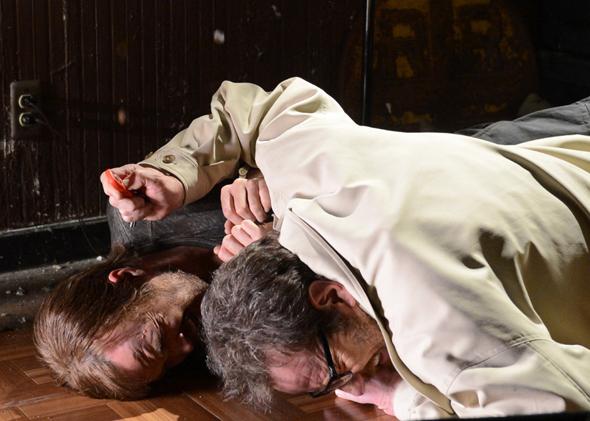Last week, I got all worked up about something Bryan Cranston said on the Emmys red carpet about the complexities of Walter White. Declaring himself Team Walt, Cranston explained that Walt was not all bad: “A man who does evil things can also truly be loving and nurturing and tender to a child,” he said. “But it’s new for audience to experience that. We think that someone should wear a black hat or a white hat, good guy or bad guy, and the world just doesn’t work like that.”
Tender to a child? I thought. When was the last time Walt was tender to a child!? Was he thinking about how he creepily talked to Brock so as to better blackmail Jesse? How could Bryan Cranston believe there existed in Walter White, the most complex and towering megalomaniac ever put to television, real decency?
And then, in last night’s finale, there was Walt being tender to a child. The more and more I think about “Felina,” the more I think that Cranston’s perspective on Walt, his performance of Walt—the monumental achievement of this monumental show—won out.*
For much of Breaking Bad’s run, since at least the third season, Vince Gilligan was way out ahead of much of the audience on Walt’s evilness. A Tad Friend profile of Bryan Cranston for The New Yorker explored the idea that the actor would not permit himself to see just how awful Walt really was, something Gilligan could see very well. “In the second season, [Cranston] told Gilligan, ‘I really think Walt’s doing it for his family,’ and Gilligan replied, ‘No I think he’s actually kind of selfish.’ ” Gilligan told Friend, “It dawned on me, slowly, that I was telling the actor he’s mistaken about his own character—and that my stupidity was jeopardizing the whole show. You don’t have to be Freud to know that Hitler thought of himself as a wonderful guy.”
That’s Vince Gilligan comparing Walter White to Hitler. But this razor-sharp, Walt-is-evil perspective did not make it into the finale. Instead, Cranston’s understanding of Walt did: There was still some decency, deep down inside there. I think, Emily, your response to this episode is exactly what Vince Gilligan and crew wanted it to feel like: like a story that, in the end, had something to do with love.
But as effective as the finale was at this, I really do think it dampens the moral vision of the show. Walt didn’t get a happy ending—death, disgrace, estrangement from one’s family do not a happy ending make—but he did get a sympathetic ending. Walter White—child-poisoner, murderer, drug lord, liar, manipulator—got to prove he really did have a heart. More confoundingly, he was presented as superior to characters who have never done anything nearly so awful. Gretchen and Eliot, with their Per Se dinners and bottles of wine from Napa and tiny knives, may be laughable yuppies, but they haven’t murdered anyone. How is Lydia, craven capitalist that she is, really worse than Walt? She has a child to support, too. Is it because Lydia isn’t a craftsman? It’s a knock against her that she doesn’t make with her bare hands a street drug so powerful it creates more addicts? That she hasn’t used her genius to make poison? As Matt points out, even Skyler gets shown up by the story: Walt, in the end, does right by his family, and Skyler doesn’t get to know.
And then there are the people Walt really is superior to, the Nazis, who are beneath Walt—and also beneath Breaking Bad. Walter White has had, in his time, some extraordinarily sympathetic nemeses, and that’s not even including Hank and Jesse. Krazy 8, Gus, Mike—these were men who, like Walt, were ruthless and often despicable, but who, also like Walt, were fully developed, humanized characters. Gus and Mike, especially, were men who did bad things but that we could respect and, at times, admire. When all of those men died it hurt a little bit to watch. When Walt strangled Krazy 8 way back in Season 1, it was a sickening turning point for the mild-mannered chemistry teacher. When Walt blew up Gus, it was Walt’s moment of triumph, but bittersweet for the audience; Gus was a more controlled businessman than Walt. When Walt killed Mike that was a tragedy.
But the Nazis are straw men: evil, vile—the least three-dimensional villains Breaking Bad has had since Tuco Salamanca. And so Breaking Bad, a show that has been more explicitly concerned with ethics than any other golden-age drama, climaxed with a fist-pumping skinhead slaughter scene, followed by broken, abused, tortured, sweet Jesse righteously strangling a guy to death.
Breaking Bad is a great show, and this was not quite a great finale, because this sequence is the most simplistic it has ever been about murder or evil.
I’m going to show you just how wrong you are, and then I’m putting that bullet in your head myself—
Willa
Correction, Sept. 30, 2013: This article originally mispelled the title of the Breaking Bad finale, “Felina.” (Return to the corrected sentence.)
—
Related in Slate:
Matt Yglesias asks if the plot of the finale wasn’t totally absurd.
Emily Bazelon on being totally satisfied with Breaking Bad’s finale.
June Thomas on Breaking Bad’s celebration of virtuosity.
